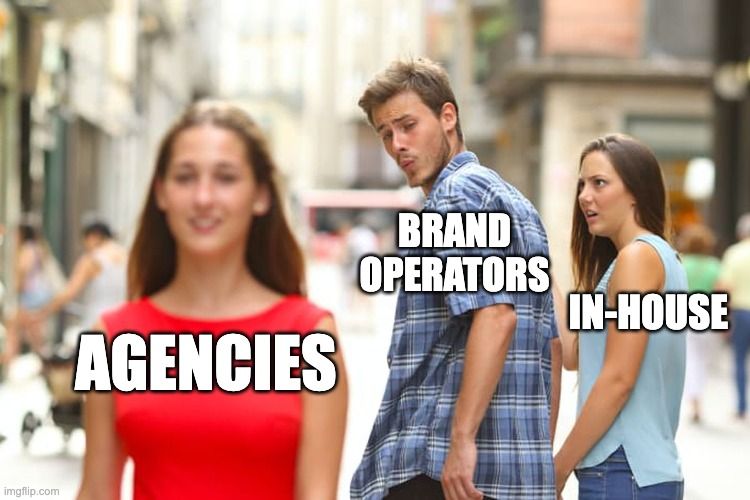I originally wrote this email as a tweet in response to a fascinating conversation between Taylor Holiday (CEO of Common Thread Collective) and Ben Kruger (former Googler and previous PPC Ponderings Podcast guest). You can check out the entire conversation (it may still be ongoing!) here, but I wanted to include my summary on the ZATO PPC blog as I think it is an important conversation to have and think through.
The context is, why is Google allowing brand bidding? It seems to be simply a revenue grabbing ploy by them to force you to buy ads on terms people are searching who obviously want to get to your website, right? That is, in large part, potentially correct, but I think it is more complex than that and wanted to share my thoughts below:
Here is where I'm at currently (my last point summarizes my main frustration with brand ads):
Not all Brand Searches Have the Same Intent
Brand searches are not always high intent, slam dunks. Brand term intent varies for different brands, and it is not uncommon for us to see users still in research mode using brand searches for this purpose. As an example, we have a household name large advertise client whose brand search CVR and ROAS are nearly equivalent to their non-brand search. This is because their name is nearly synonymous with their industry, so people use their name as a *starting* search place in order to research the industry Which makes a wholesale blocking “rule” of competitor/brand bidding unhelpful since it doesn’t account for every case in which a user is not necessarily searching a brand term because they are actually decided. I think brand searches, while on average, tend to be very high intent, are too complex to have a one sized fits all ruling here by Google.
Legal Anti-trust Issues Come Into Play with Brand Search
> There are FTC guidelines that come into play here that I think Google is (understandably) avoiding by not making a decision on this. The most well known case is when the FTC sued 1-800-Contacts for agreeing with competitors not to bid on each other’s brands. https://www.ftc.gov/legal-library/browse/cases-proceedings/141-0200-1-800-contacts-inc-matter Basically, the FTC said this was anticompetitive behavior because they were preventing consumers from having access to competitor choices on those (their own brand) terms. I bring this up just to note, that there are actual legal complications I think Google may be avoiding here by allowing brand bidding. They have enough of their own lawsuits to deal with, I can’t see them wanting to risk fighting the government over this when it also removes their own revenue.
Brand Is Definitely an Easy Major Revenue Source for Google
ll that to say, I completely agree that this is obviously a revenue grabbing play by Google, I just think it’s one of those times where the reality of it aligns with Google’s desire to maintain brand ad revenue. I completely agree with the frustration of the "brand tax" and the notion of paying for your own high intent brand terms simply to guard against competitors. I think you (Taylor) make obvious points in your previous arguments as to how this primarily benefits Google.
Google's Close Variant Matching and PMax Push More Competitors Unintentionally into Brand Searches, which Raises Auction Costs (and thus, Google Revenue)
I am frustrated by the fact that Google is itself forcing more competition on brand searches through broader close variant matches and PMax campaigns that more readily match on competitor terms, thus forcing more (unintentional) competition on brand terms than existed in the past.
Google Bid Floors Artificially Inflate Brand CPCs
I am *very* frustrated by Google's obvious threshold bidding changes over the past few years that have elevated low-competition brand searches to higher CPCs than they were previously, as they adjust how their auction reserve prices are calculated. I have written on this in detail here: Let's Talk Google Ads Bid Floors (or Reserve Prices)
This is (in my belief) the main reason Brand CPCs are so much higher than they were a few years ago on terms with very little competition. Those CPCs that used to cost a brand, let's say $0.07 to guard their brand, may now cost $1 to do the same (against the same competitors!). It is my belief those changes are driven primarily by the bid floor pricing recalculation and not actual competition (you can see this in terms of auction insights overall competition changes. Even if existing competitors have raised prices, this wouldn't explain a 10-20x bid cost on what used to be very high Quality Score terms, which would help keep the CPCs low. Again, this is also why Ad Rank is likely hiding some of these things, which I have expressed concern about elsewhere)... and I think that is a HUGE part of the frustration here for brands.
In my opinion, guarding your own terms wouldn't be that big of a deal if it wasn’t so expensive. THIS IS MY MAIN ISSUE RIGHT NOW WITH BRAND SEARCH. In the past, it really wasn’t as big of a deal because it was so cheap for a brand to guard its own, it was a no-brainer in most cases. It really was a low cost insurance option, that also avoided the first two issues I brought up above.
So, the main issue with brand these days, IMO, is that the auctions themselves are priced too high, and I believe this is primarily because of Google tinkering.
Put a different way, I think this is a failure of the ad rank formula in an auction to accurately identify the financial investment for a company in their own brand terms.
Current Ad Rank bid floor mindset: "we see that these terms are valuable for a brand since they lead to many conversions and high profit. Therefore, we will raise auction bid floor prices to represent that value since the account clearly has margin for these high converting terms"
The problem though, is I don't think Google is taking into account that Brand terms, being (mostly) bottom funnel, are actually LOWER profit terms for a company since, and this is crucial to understand, they are the result of previous marketing investment (which may not be on channel, which is also why Google can't track that person in every instance). That is the hidden cost to Brand terms!
That's why, I think the solution is to (once again) lower bid floors and auction prices by bringing back whatever the old Ad Rank formula to accurately represent a brand's true financial cost for a brand term. I think Google is missing that here, which is why brands are frustrated.
Them’s my $0.02 on this :)


.webp)


.jpeg)

.jpg)




